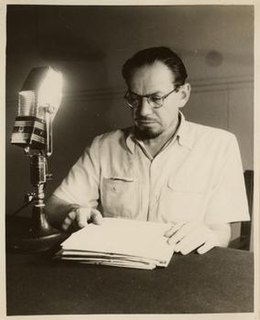A Quote by Pope Francis
Working for a just distribution of the fruits of the earth and human labor is not mere philanthropy. It is a moral obligation.
Quote Topics
Related Quotes
For, according to the teachings of Islam, moral knowledge automatically forces moral responsibility upon man. A mere Platonic discernment between Right and Wrong, without the urge to promote Right and to destroy Wrong, is a gross immorality in itself, for morality lives and dies with the human endeavour to establish its victory upon earth.
I don't have the slightest interest in gold. I like understanding what works and what doesn't in human systems. To me that's not optional; that's a moral obligation. If you're capable of understanding the world, you have a moral obligation to become rational. And I don't see how you become rational hoarding gold. Even if it works, you're a jerk.
In the ideal world, philanthropy should be redundant or at least it should be at the edges, as innovation or risk capital. But it's far from an ideal world; the wealthy are cornering more and more opportunities and resources from this planet. So, the big challenge for philanthropy is... can it engage with the distribution of wealth itself?
The change began with John Stuart Mill and the Utopians . When Mill pointed out that economics had no ultimate solution to the problem of distribution , that society might do with the fruits of its toil as it saw fit, he introduced into the mechanical calculus of the market a conflicting calculus of moral judgment.
We are now returning to the 18th century empirical approach with the new interest in the evolutionary basis of ethics, with 'experimental' moral philosophy and moral psychology. As a result, we understand better why moral formulas are experienced as ineluctable commands, even if there is no commander and even if the notion of an inescapable obligation is just superstition. So moral philosophy has made huge progress.





































